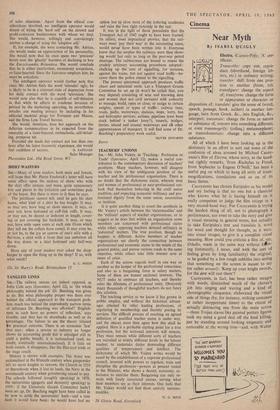TANGLED LINES
SIR,—The railway unions are indeed opposed, as John Cole says (Spectator, April 12), to 'the whole philosophy behind the job' Dr. Beeching was given to do. But what philosophy proper was there ever behind the official approach to the transport prob- lem, much less behind the imprudently narrow terms of reference Dr. Beeching was afforded? 'English- men as such have no powers of reflection,' says Goethe, and that has its drawbacks as well as its advantages. The failure to see the theory vitiated Ilhe practical outcome. There is an economic 'law' that says: when a service or industry no longer shows an accounting profit but is adjudged still to yield a public benefit, it is nationalised (and, no doubt, eventually internationalised). If it fails on both counts, it disappears, like the flint-tool trade or the stage coach. History is strewn with examples. The Army was nationalised in the fifteenth century when gunpowder left no more knights to ransom, the Church in 1535 or thereabouts when it lost its lands, the Navy in the seventeenth century when privateering ceased to pay. The schools followed (roughly speaking) in 1870, the universities (gingerly and demurely speaking) in 1919: if the University Grants Committee hadn't been set up, Dr. Beeching might have been called in by now to settle the universities' hash—and a rare hash it would have been: he would have had no option but to close most of the tottering academies and raise the fees right riotously in the rest. It was in the light of those precedents that the Transport Act of 1947 ought to have been framed. Its silliest, most impractical proviso, that the rail- ways must 'pay their way' in the accounting sense, would never have been written into it. Everyone knew that the surplus the railways were then show- ing would last only as long as the post-war petrol shortage. The railwaymen are bound to resent the crudely arbitrary accounting procedures adopted: chalking up the 'cost of signalling, for instance, against the trains, but not against road traffic—be- cause there the police attend to the signalling. The present piecemeal approach produces traffic chaos and industrial strife. Let a Transport Grants Committee be set up (it won't be called that, you may depend) consisting of wise and knowing men and women (but not civil servants) with authority to manage, build, open or close, or assign to certain weights, speeds or types of traffic: railway lines, roads, paths, motorways, stations, stops; lorry, bus and helicopter services; airlines, pipelines (ever been stuck behind a tanker lorry?), tunnels, bridges, ferries, inland and coastal waterways and all other appurtenances of transport. It will find some of Dr. Beeehing's preparatory work useful.
Derry
OLIVER EDWARDS


































 Previous page
Previous page